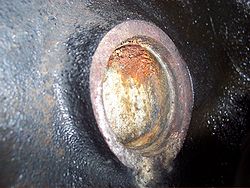You're welcome I love them river boats you guys got back then helps a lot in the mekong delta with the seals Sir the freeze plug are right along the engine block-How's the heater hoses? You can pressure test it to find where its leaking

Freeze plug is another name for core plug or expansion plug, and is commonly referred to as a "frost plug." They are a subset of the plugs on a car engine cylinder block or cylinder head. The traditional plug is a thin, domed, disc of metal which fits into a machined hole in the casting and is secured by striking or pressing the center to expand the disc.
A true freeze plug is an expansion plug located in the side of an engine block that is supposed to protect the block against freeze damage. Water expands when it turns to ice, and if the coolant does not have enough antifreeze protection it can freeze and crack the engine block. The freeze plugs (there are usually several) are supposed to pop out under such conditions to relieve the pressure on the block.
Most of the plugs to be found on an engine are actually to plug the holes where sand cores have been held. The sand cores are used in the casting process to form internal cavities in the engine block or cylinder head, for cooling water for example, and so should really be referred to as core plugs.
Freeze plugs can often be a source of troublesome leaks as a result of internal cooling system corrosion. Ease of replacement depends on accessibility. In many cases the plug area will be difficult to reach and using a mallet to perform maintenance or replacement will be nearly impossible without special facilities. Expanding rubber plugs are available as replacements when access is a problem.
Friday, May 8th, 2009 AT 9:40 PM



